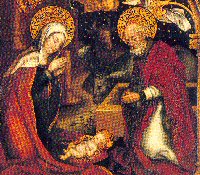After so long in positions of power, the O’Hanlons (and indeed with them, the O’Neills and Magennisses) were wont to forget the allegiance (spiritual at least) they owed to the Church and were frequently in conflict with it.
It was usually the clansmen who lost out. We must remember that the Church was still the most powerful institution – sometimes only after the government – in practically every country of
From the Register of Archbishop Sweteman of 18 September 1367 we learn that the ‘O’Handeloyn had prevented the clergy of the Cathedral from performing divine service in the church and had hindered and despoiled them’. We learn there too that O’Hanlon had often deceived the Archbishop, even after receiving absolution for past crimes.
About the same time we find ‘Malachy O’Hanloyn, King of Erthyr’ admonished and warned, to compel one of his subjects to restore certain goods and clothing taken by violence from the Archbishop’s retinue.
The Archbishop had several times excommunicated Malachy – with his people – as usurpers of the goods of the church. Thus (from an entry of 7 December 1366) we learn that though they had made promises of amendment and restitution, they had on absolution, only behaved worse than before until they were again sentenced.
In Archbishop Fleming’s Register 1 May 1407 we learn that he had excommunicated Argallus O’Hanlan, Captain of his nation, Malachy O’Hanlan and Odo McLoy, together with their familiar ‘aiders and abettors, for various injuries inflicted upon himself and his tenants, especially for the slaying of Maurice Ddowgenan, his tenant and falconer’.
He instructed his clergy to publish the excommunication and interdict on Sunday and festivals in all their churches and market places, while clad in albs and stoles, with cross erect, bells and candles, until further order. At the same time he admonished all, English and Irish, within his diocese to refrain from conversation, eating or drinking with the above-named persons, and desired that they should not be sold bread, beer, salt or any of the necessities of life.
Serious stuff indeed! And it invariably was received as such.
This was before the Protestant Reformation in Europe and
Bagenal lineage up to date
